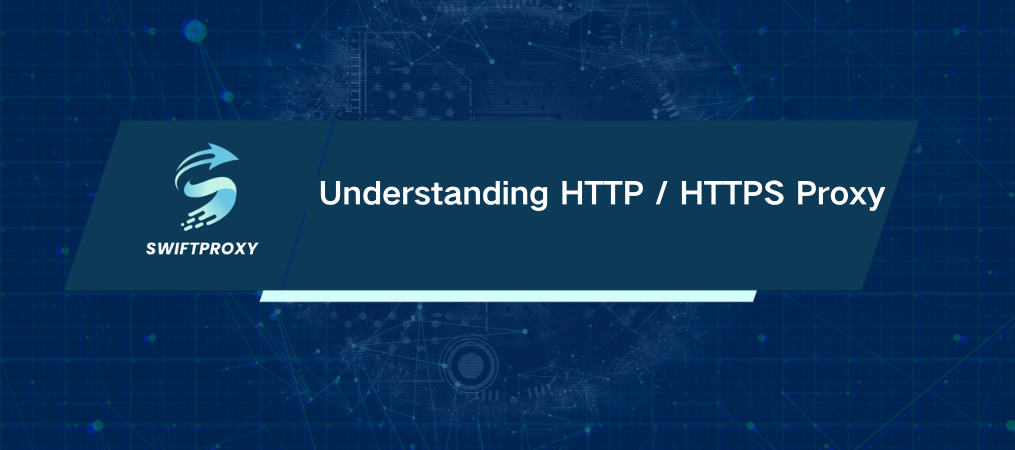Understanding HTTP / HTTPS Proxy

The world of proxies can be confusing. HTTP proxy, HTTPS proxy, SOCKS proxy… it’s enough to make anyone’s head spin. But getting it wrong? That can compromise your security or leave you scrambling to find a workaround. So, let's break it down.
Whether you're protecting your identity online or scraping data for research, choosing the right proxy is crucial. It's about understanding when to go for the basics or when you need something more robust. The good news? I'm here to give you the inside scoop on HTTP and HTTPS proxies so you can make the right choice.
Introduction to HTTP Proxy
In simple terms, an HTTP proxy is like a middleman between your device and the internet. When you visit a website, your request doesn't go directly to the site. Instead, it's routed through a proxy server, which then makes the request on your behalf. Here's how it works:
1. You send a request to a website.
2. The proxy server intercepts it and strips your IP address.
3. The server then forwards the request to the site, masked as the proxy's IP.
4. The website responds to the proxy, which then sends the response back to you.
This might sound like a lot, but with a high-quality proxy, this process takes only milliseconds.
The Various HTTP Proxy Options
Not all HTTP proxies are created equal. The key difference lies in the level of anonymity they provide.
1. Transparent Proxy
Commonly used by schools, businesses, and governments, a transparent proxy controls access and filters web traffic. You don’t need to log in—it's always active. But don't expect to hide your IP address with this one. Websites can still see it. Transparent proxies are mainly used to block access to restricted content or control internet use in corporate environments.
2. Anonymous Proxy
An anonymous proxy does a better job of hiding your identity by replacing your real IP with a proxy's. It's a popular choice for people looking to mask their location or access geo-restricted content. But Some websites (like streaming platforms) might block proxies, making it trickier to access certain content.
3. Elite Proxy (Highly Anonymous Proxy)
These proxies go the extra mile to keep your identity hidden. Like the anonymous proxy, they hide your IP, but the difference is subtle—elite proxies won't even let the website know that they're proxies. They act like any other regular user. But, there's a downside: Since it's still an HTTP connection, you're not getting the added security of HTTPS.
HTTP and HTTPS Proxy Compared
The most significant difference between HTTP and HTTPS proxies is the level of security they offer.
HTTP Proxy: Think of it as a basic, no-frills proxy. It hides your IP, but it doesn't encrypt the data. It's fast and easy to set up, but it leaves your connection vulnerable to eavesdropping and data theft.
HTTPS Proxy: This is your go-to if you need security on top of anonymity. HTTPS proxies encrypt your connection, meaning your data is much harder to intercept. The added layer of security is essential for sensitive tasks like online banking or making purchases.
Which Proxy Should You Choose
It all boils down to your needs.
1. When to Use an HTTP Proxy:
Streaming Content: Need access to a restricted video or music site? HTTP proxies are a quick and easy way to get around geo-blocks.
Data Scraping: If you're collecting large amounts of data for research or testing, HTTP proxies are efficient and budget-friendly.
Website Monitoring: If you're tracking competitors or monitoring an e-commerce platform, HTTP proxies work well for non-sensitive browsing.
2. When to Use an HTTPS Proxy:
Secure Transactions: Whether you're making a purchase or transferring sensitive data, HTTPS proxies encrypt your traffic and add a layer of security.
Anonymous Browsing: If you're browsing the web without leaving a trace, HTTPS proxies give you peace of mind.
Avoiding Tracking: Need to sidestep cookies or other tracking methods? HTTPS proxies ensure that your data remains encrypted and your actions stay anonymous.
The Bottom Line
HTTP proxies were the go-to for many users in the past, but as security became a priority, HTTPS proxies have taken the lead. For streaming or internal testing, HTTP proxies may suffice. But when security is a concern—like with online banking or data scraping—you'll want to go with HTTPS.
At Swiftproxy, we offer HTTPS proxies that give you the benefits of both worlds: speed and security. With one of the fastest residential proxy infrastructures in the industry, we're ready to meet your data needs without compromising on privacy.
So, if you're ready to take your proxy game to the next level, check out our pricing plans and see how we can help.

















































